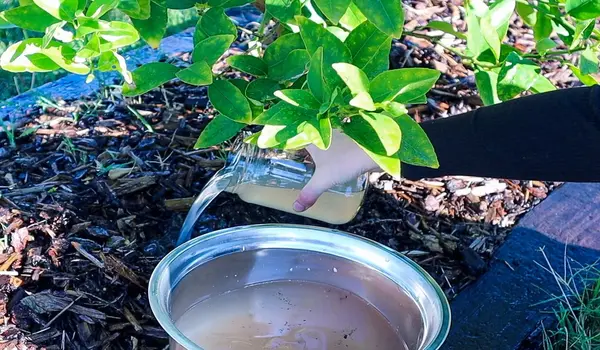Advantages of Liquid Fertilizer for Plants
Liquid fertilizer for plants offers numerous advantages over traditional fertilizers. It provides a quick and efficient way to deliver essential nutrients to plants. Unlike granular fertilizers, which require time to break down, liquid fertilizers are immediately available to plants. This feature makes them ideal for correcting nutrient deficiencies rapidly and promoting healthier, more vibrant growth.
Liquid fertilizer for plants ensures that the nutrients are evenly distributed, hence balanced growth. Also, the application process is easy and flexible, where you can apply the fertilizer either through foliar spraying or directly to the soil. This is why it is so popular among gardeners and farmers who want to maximize efficiency and plant health.
How Liquid Fertilizer for Plants Works
Liquid fertilizers dissolve nutrients in water, making them easily absorbed by plants through their roots or leaves. This quick absorption process immediately boosts the growth of the plants, and it is a powerful tool during critical growth stages. The availability of nitrogen, phosphorus, potassium, and trace elements directly available, and there is no lag time as experienced with solid fertilizers.
Liquid fertilizer for plants, when applied to the soil, will improve microbial activity, which will enhance soil health. Foliar application is the most effective when the plants are under stress or urgently require a nutrient supply. This makes liquid fertilizers versatile and effective.
Types of Liquid Fertilizer for Plants
There are different types of liquid fertilizer for plants, each catering to specific needs:
Organic liquid fertilizers- they use organic matter such as compost tea or fish emulsion; therefore, the soil's health is enhanced.
Synthetic liquid fertilizers-the ratio of nutrient levels used to form the fertilizers ensures uniformity and results right away.
Specialty liquid fertilizers-they are developed specifically for plant types and certain growth phases like flowering and fruiting to meet special needs.
The type of liquid fertilizer to use on plants depends on the needs of your plants and your objectives in gardening.
Best Practices for Applying Liquid Fertilizer on Plants
To get the most out of liquid fertilizer for plants, here are some best practices:
Dilution: Always dilute the liquid fertilizer according to the manufacturer's instructions to avoid over-fertilizing.
Timing: Apply during early morning or late afternoon to prevent evaporation and maximize absorption.
Frequency: Use liquid fertilizer for plants regularly but in moderation as overuse will lead to nutrient buildup.
Application Method: Foliar spraying and soil drenching. This depends on what the plants really need.
Adhering to these methods will bring you the best results as well as the health of your plants.
Common Nutrients in Liquid Fertilizer for Plants
Liquid fertilizers for plants contain a mixture of vital nutrients, including:
Nitrogen (N): The nutrient encourages the growth of leaves and gives the plants a healthy look.
Phosphorus (P): Promotes root growth and flowering.
Potassium (K): Increases overall plant health and disease resistance.
Micronutrients: Magnesium, calcium, and iron are some examples of micronutrients involved in the metabolism of the plant and chlorophyll formation.
These nutrients in liquid fertilizer for plants meet the plant's all growth stages from seedling to maturity.
Environmental Benefits of Liquid Fertilizer for Plants
It also has the advantage of helping the environment positively. Since it is liquid fertilizer, its application will minimize the run-off of nutrients that lead to water pollution. Also, most liquid fertilizers are made from recycled or sustainable materials that help in the reduction of waste and contribute to environmentally friendly farming.
Bulk Agro Chem stresses sustainable solutions in its liquid fertilizers. It helps your plants grow while protecting the environment.
Liquid Fertilizer for Plants in Various Stages of Growth
The Liquid fertilizer is so versatile for plants' every growth phase:
Stage Seedling : Nutrients supplied to juvenile plants facilitate a strong basis of robust roots and shoot development
Stage Vegetative: A leafy development and more vigor enhancement
Flowering and Fruiting Stage: Promotes boosts in phosphorus and potassium levels with which blooming and fruit will develop
When you tailor the application of liquid fertilizer on plants towards the growth phase, it maximizes yields and quality.
Challenges and Solutions with Liquid Fertilizer for Plants
Liquid fertilizer for plants has many advantages but, of course, it comes with its challenges. Over-fertilization can cause nutrient toxicity, while under-dilution can harm plant roots. To minimize the risk of these challenges:
Read product labels and strictly adhere to recommended guidelines.
Check your plants for signs of nutrient imbalance, such as yellowing leaves or stunted growth.
Make a soil test before the application of liquid fertilizer to plants. This will indicate the levels of nutrients in the soil.
Why Select Bulk Agro Chem's Liquid Fertilizer for Plants?
Bulk Agro Chem manufactures quality liquid fertilizer for plants that will cater to a wide variety of agricultural and gardening needs. Our products are engineered for efficiency, sustainability, and ease of use, giving your plants the care they need.
By choosing Bulk Agro Chem, you’re investing in superior plant nutrition and contributing to sustainable farming practices.
Conclusion
Liquid fertilizer for plants is a game-changer for modern gardening and farming. Its fast-acting nutrients, versatility, and environmental benefits make it an essential tool for anyone looking to achieve faster growth and healthier plants. Whether you choose a commercial product from Bulk Agro Chem or mix your own, liquid fertilizer for plants offers unmatched advantages for plant care. Use this innovative solution to watch your garden thrive like never before.
Bulkagrochem
Submit your contact number & get exciting offer
Bulkagrochem.com
Bulk Purchase & Get Bulk Discount
Share your number to receive customized bulk pricing, availability updates, and exclusive offers directly via WhatsApp.

Recommended Products



